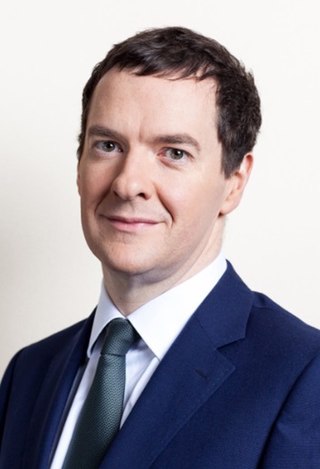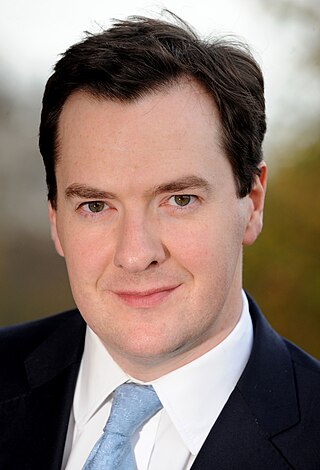Related Research Articles

The chancellor of the Exchequer, often abbreviated to Chancellor, is a senior minister of the Crown within the Government of the United Kingdom, and head of His Majesty's Treasury. As one of the four Great Offices of State, the chancellor is a high-ranking member of the British Cabinet.

National Insurance (NI) is a fundamental component of the welfare state in the United Kingdom. It acts as a form of social security, since payment of NI contributions establishes entitlement to certain state benefits for workers and their families.

Alistair Maclean Darling, Baron Darling of Roulanish, was a British politician who served as Chancellor of the Exchequer under Prime Minister Gordon Brown from 2007 to 2010. A member of the Labour Party, he was a member of Parliament (MP) from 1987 to 2015, representing Edinburgh Central and Edinburgh South West.

George Gideon Oliver Osborne is a former British politician and newspaper editor who served as Chancellor of the Exchequer from 2010 to 2016 and as First Secretary of State from 2015 to 2016 in the Cameron government. A member of the Conservative Party, he was Member of Parliament (MP) for Tatton from 2001 to 2017. He was editor of the Evening Standard from 2017 to 2020.

A living wage is defined as the minimum income necessary for a worker to meet their basic needs. This is not the same as a subsistence wage, which refers to a biological minimum, or a solidarity wage, which refers to a minimum wage tracking labor productivity. Needs are defined to include food, housing, and other essential needs such as clothing. The goal of a living wage is to allow a worker to afford a basic but decent standard of living through employment without government subsidies. Due to the flexible nature of the term "needs", there is not one universally accepted measure of what a living wage is and as such it varies by location and household type. A related concept is that of a family wage – one sufficient to not only support oneself, but also to raise a family.

In the United Kingdom, taxation may involve payments to at least three different levels of government: central government, devolved governments and local government. Central government revenues come primarily from income tax, National Insurance contributions, value added tax, corporation tax and fuel duty. Local government revenues come primarily from grants from central government funds, business rates in England, Council Tax and increasingly from fees and charges such as those for on-street parking. In the fiscal year 2014–15, total government revenue was forecast to be £648 billion, or 37.7 per cent of GDP, with net taxes and National Insurance contributions standing at £606 billion.

The National Minimum Wage Act 1998 creates a minimum wage across the United Kingdom. From 1 April 2023, the minimum wage is £10.42 for people aged 23 and over, £10.18 for 21- to 22-year-olds, £7.49 for 18- to 20-year-olds, and £5.28 for people under 18 and apprentices.

The first MacDonald ministry of the United Kingdom lasted from January to November 1924. The Labour Party, under Ramsay MacDonald, had failed to win the general election of December 1923, with 191 seats, although the combined Opposition tally exceeded that of the Conservative government, creating a hung parliament. Stanley Baldwin remained in office until January 1924.

Clement Attlee was invited by King George VI to form the Attlee ministry in the United Kingdom in July 1945, succeeding Winston Churchill as Prime Minister of the United Kingdom. The Labour Party had won a landslide victory at the 1945 general election, and went on to enact policies of what became known as the post-war consensus, including the establishment of the welfare state and the nationalisation of some industries. The government's spell in office was marked by post-war austerity measures, the violent crushing of pro-independence and communist movements in Malaya, the grant of independence to India, the engagement in the Cold War against Soviet Communism as well as the creation of the country's National Health Service (NHS).
IR35 is the United Kingdom's anti-avoidance tax legislation, the intermediaries legislation contained in Chapter 8 of Income Tax Act 2003. The legislation is designed to tax 'disguised' employment at a rate similar to employment. In this context, "disguised employees" means workers who receive payments from a client via an intermediary, i.e. their own limited company, and whose relationship with their client is such that had they been paid directly they would be employees of the client.
Working Tax Credit (WTC) is a state benefit in the United Kingdom made to people who work and have a low income. It was introduced in April 2003 and is a means-tested benefit. Despite their name, tax credits are not to be confused with tax credits linked to a person's tax bill, because they are used to top-up wages. Unlike most other benefits, it is paid by HM Revenue and Customs (HMRC).
In 2004, the New Zealand Labour government introduced the Working for Families package as part of the 2004 budget. The package, which effectively commenced operating on 1 April 2005, had three primary aims: to make work pay; to ensure income adequacy; and to support people "into work".
Income taxes are the most significant form of taxation in Australia, and collected by the federal government through the Australian Taxation Office. Australian GST revenue is collected by the Federal government, and then paid to the states under a distribution formula determined by the Commonwealth Grants Commission.

The Liberal welfare reforms (1906–1914) were a series of acts of social legislation passed by the Liberal Party after the 1906 general election. They represent the emergence of the modern welfare state in the United Kingdom. The reforms demonstrate the split that had emerged within liberalism, between emerging social liberalism and classical liberalism, and a change in direction for the Liberal Party from laissez-faire traditional liberalism to a party advocating a larger, more active government protecting the welfare of its citizens.

Benedict Michael Gummer is a British businessman and former politician. He is a partner of Gummer Leathes, a property developer. He is a senior adviser to McKinsey & Company, the management consultancy, a visiting fellow at the Blavatnik School of Government at Oxford University and a member of the advisory board of the Office for Place.

The June 2010 United Kingdom Budget, officially also known as Responsibility, freedom, fairness: a five-year plan to re-build the economy, was delivered by George Osborne, Chancellor of the Exchequer, to the House of Commons in his budget speech that commenced at 12.33pm on Tuesday, 22 June 2010. It was the first budget of the Conservative-Liberal Democrat coalition formed after the general election of May 2010. The government dubbed it an "emergency budget", and stated that its purpose was to reduce the national debt accumulated under the Labour government.

The Apprenticeship Levy is a UK tax on employers which is used to fund apprenticeship training.

Gordon Brown served as Chancellor of the Exchequer of the United Kingdom from 2 May 1997 to 27 June 2007. His tenure was marked by major reform of Britain's monetary and fiscal policy architecture, transferring interest rate setting powers to the Bank of England, by a wide extension of the powers of the Treasury to cover much domestic policy and by transferring responsibility for banking supervision to the Financial Services Authority. Brown presided over the longest period of sustained economic growth in British history. He had previously served as Shadow Chancellor of the Exchequer in the Tony Blair Shadow Cabinet from 1994 to 1997. As Shadow Chancellor, Brown as Chancellor-in-waiting was seen as a good choice by business and the middle class.

George Osborne served as Chancellor of the Exchequer from May 2010 to July 2016 in the David Cameron–Nick Clegg coalition Conservative-Liberal Democrat government and the David Cameron majority Conservative government. His tenure pursued austerity policies aimed at reducing the budget deficit and launched the Northern Powerhouse initiative. He had previously served as Shadow Chancellor in the Shadow Cabinet of David Cameron from 2005 to 2010.

The March 1993 United Kingdom budget was delivered by Norman Lamont, the Chancellor of the Exchequer, to the House of Commons on 16 March 1993. It was the third and final budget to be presented by Lamont during his tenure as chancellor, and the final spring budget to be outlined before the Conservatives unified their tax and spending plans into one budget statement.
References
- ↑ "Tax Credits Act 2002 - Explanatory Notes". Legislation.gov.uk. 2002.
- ↑ "Labour 'would support U-turn' over tax credits". BBC News. 25 October 2015.
- ↑ "The No 10 handover has begun – and Osborne's rivals have a target | Simon Jenkins". the Guardian. 7 October 2015. Retrieved 19 August 2022.